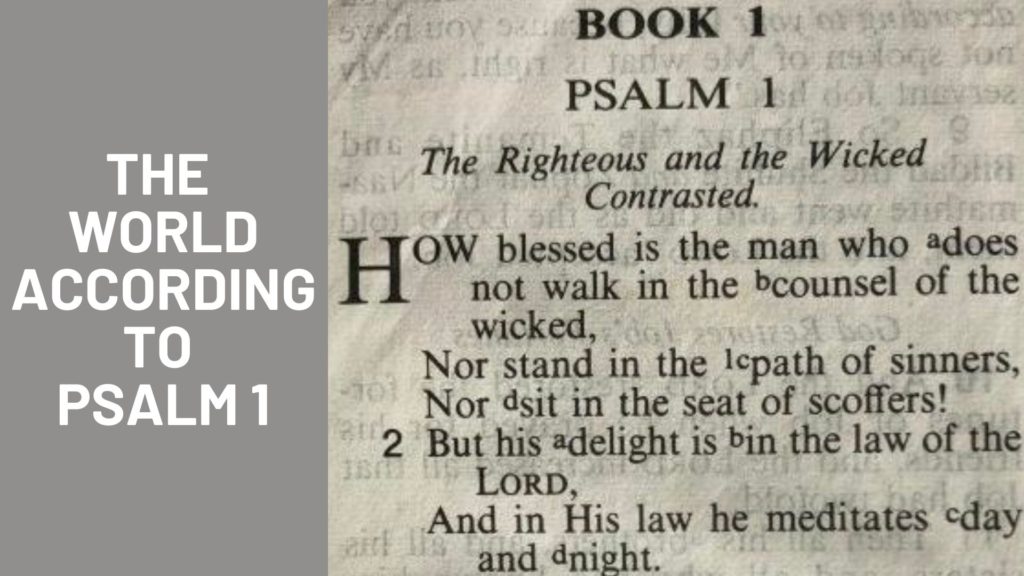
Recently my wife and I began watching the “Star Wars” episodes in their proper chronological order. The last episode we watched contained the showdown between Obi Wan and Anakin Skywalker (i.e., the future Darth Vader). Just before the climatic dual, Obi Wan informed Anakin that “Only a Sith deals in absolutes.” In case you are unaware, Siths are committed to the “Dark Side.” In other words, only really bad guys believe in absolutes, which ironically is also an absolute. But hey, it’s Star Wars, so who is really paying attention anyway. Nevertheless, absolutes are an unavoidable part of life; we deal with them wherever we go (e.g., gravity, the need for oxygen and water, etc). Some are to our benefit, some are neutral, and some we generally chose to ignore, like the absolutes found in the Bible. A good example of just such an absolute is found in Psalm 1.
Psalm 1 is a startling psalm, which is a significant reason for why it’s the first one in the Book of Psalms. It’s startling because the psalmist observes that there are only 2 types of people in the world, there are the godly and the ungodly. Verse 1 appears to categorized the ungodly into 3 degrees, they are the “wicked,” the “sinners,” and the “scoffers” (NASB). Some suggest that these labels are synonyms that simply refer to the same type of person (i.e., the ungodly), but others see a progression from the lesser to the greater in the spectrum of ungodly people. I personally agree that the psalmist is describing a progression towards entrenched ungodliness.
On the other side there are the godly, which are marked by 2 passions. First, they “delight” in the “law of the Lord,” and second, they meditate on it constantly. As the psalmist put it, “And in His law he/she meditates day and night.” Thus, for the psalmist there are only 2 types of people in the world, those who love God’s word and those who reject it.
At this point some may object by asserting “That is a rather limited perspective; the world is much too diverse for such a prospect to be true”; and I’m sure there are countless other objections. But the problem with such objections is that the psalmist wasn’t too impressed with them. You either delight in God’s word, or you don’t. You either study it to seek Him and His will or you don’t. It’s just that simple.
Some have excuses for not ruminating over God’s word. Excuses such as “It’s not really relevant today’s world”; or “It’s was written so long ago and translated so many times, who knows what it originally said?” Other common excuses are that “It’s too hard to understand”; or “I don’t really have time for it.” The psalmist observed that such excuses do not deter those that love God; consequently, they are constantly availing themselves to the Scriptures. More importantly, it should be noted that the psalmist didn’t write that the godly simply “read” God’s word, but that they “meditate” upon it, and they do so “day and night.” Plainly stated, the Bible is not your personal daily greeting card from God. Understanding it requires appreciation, devotion, discipline, reason, and faith. It is not for the lazy and indifferent, it is for those that are serious about finding God and worshiping Him. And least we forget, in the psalmist’s day “the law of God” referred to just the Pentateuch and not the entire Bible that we now possess. It referred to only the first 5 books, which includes Numbers and Deuteronomy (which basically means the “second law” or “repetition of the law”; in other words, “now let’s go over this again”).
But some may suggest, “Well none of this actually affects me since I don’t really fall into either camp.” And there is the rub. Anyone making such a claim objectively places themselves outside of the camp of the godly, which means that for the psalmist they are being influenced by the wicked, or by sinners, or possibly by scoffers. Only the ungodly appease themselves with reasons for not studying the Bible. The godly, on the other hand, enjoy meditating on the Scriptures because in them they find God and His will for their lives. Only the ungodly “trust in confusion” (Is 59.4), and only they find excuses for neglecting God’s word. As the apostle Peter explained, while referring to specific New Testament letters, that “. . . the untaught and unstable distort, as they do also the rest of the Scriptures, to their own destruction” (2 Pet 3.16).
So if it’s been a while since you invested time in meditating upon God’s word, then it means you are on the wrong path. It means that you are being influenced by the wicked, or by sinners, or maybe even by scoffers. Those that walk in their “ways” inevitably begin to look like the wicked, and after a while they windup standing around with sinners. And in the end, they find themselves sitting among their fellow scoffers. In other words, they become the ungodly.
Only by delighting in the Bible, and being delighted in it in such a way that one is constantly thinking about what it says, trusting in what it means, and applying it to one’s daily life protects that one from the future of the ungodly. It protects them because it should inevitably lead to saving faith in the Lord Jesus Christ, thereby rescuing them from the fate of the ungodly. And there is a different destiny for the ungodly. The psalmist described their end in this manner: “The wicked are not so, but they are like chaff that the wind blows away. Therefore, the wicked will not stand in the judgment, or sinners in the assembly of the righteous. For the Lord knows the way of the righteous, but the way of the wicked will perish” (Ps 1.4-6).
Monte Shanks Copyright © 2014